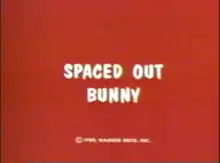Spaced Out Bunny
Spaced Out Bunny is a Warner Bros. cartoon starring Bugs Bunny and Marvin the Martian. The cartoon was part of the television special Bugs Bunny's Bustin' Out All Over on CBS, which aired May 21, 1980.[1]
| Spaced-Out-Bunny | |
|---|---|
 | |
| Directed by | Chuck Jones Phil Monroe |
| Produced by | Chuck Jones |
| Starring | Mel Blanc |
| Color process | Technicolor |
| Distributed by | Warner Bros. Pictures |
Release date | May 21, 1980 |
Running time | 6 Minutes |
Spaced Out Bunny is one of four Bugs Bunny cartoons produced during 1979-1980, the first new shorts since 1964's False Hare. Spaced Out Bunny would also be the last Warner Brothers-released short to have Mel Blanc voicing Bugs.
Plot
While walking in a forest, Bugs Bunny wonders aloud how everyone is out to get everyone else; this is illustrated by hostile behavior as Bugs' interacts with, among other things, a rock and a butterfly. He then sees a carrot on a line and begins to eat it, unaware that it is a trap set by Marvin the Martian.
Marvin's purpose for capturing Bugs (with what Marvin explains is an "ACME Super Rack and Pinion Tranquilizer Carrot") is to provide a playmate for Hugo the Abominable Snowman (from 1961's The Abominable Snow Rabbit). After Bugs awakens and realizes where he is, Marvin explains his rationale before turning Hugo loose on Bugs ("Oh no, not again!" cries Bugs, remembering his previous encounter with Hugo). The rest of the cartoon plays similar to the premise of Snow Rabbit, including Hugo's intention to "hug him and stroke him and cuddle him and call him George." Bugs regains the upper hand on his captors by suggesting to Hugo that he needs a robot; Marvin attempts to make a getaway but Hugo reaches into the spaceship and repeats his lines. When an agitated Marvin demands that Hugo cease his behavior and states that he is not a robot, an angry Hugo spanks him.
Bugs then whispers in Hugo's ear, suggesting something that he would be good at. The scene cuts to Hugo's wrist, where he proudly displays his new "Mickey Martian" wristwatch. Bugs then climbs into the spacecraft and gets Hugo to practice his Frisbee toss by hurling the ship toward the Earth.
References
- Beck, Jerry; Friedwald, Will (1989). Looney Tunes and Merrie Melodies: A Complete Illustrated Guide to the Warner Bros. Cartoons. Henry Holt and Co. pp. 370–371. ISBN 0-8050-0894-2.
External links
| Preceded by Portrait of the Artist as a Young Bunny |
Bugs Bunny Cartoons 1980 |
Succeeded by Box Office Bunny |
